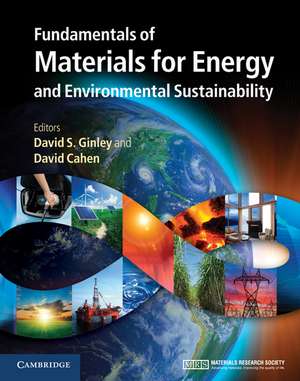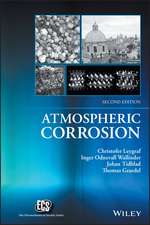Fundamentals of Materials for Energy and Environmental Sustainability
Editat de David S. Ginley, David Cahenen Limba Engleză Hardback – 29 noi 2011
Preț: 788.93 lei
Preț vechi: 917.36 lei
-14% Nou
Puncte Express: 1183
Preț estimativ în valută:
150.98€ • 157.04$ • 124.64£
150.98€ • 157.04$ • 124.64£
Carte disponibilă
Livrare economică 22 martie-05 aprilie
Preluare comenzi: 021 569.72.76
Specificații
ISBN-13: 9781107000230
ISBN-10: 1107000238
Pagini: 772
Ilustrații: 450 colour illus. 80 tables
Dimensiuni: 223 x 287 x 29 mm
Greutate: 1.84 kg
Ediția:New.
Editura: Cambridge University Press
Colecția Cambridge University Press
Locul publicării:New York, United States
ISBN-10: 1107000238
Pagini: 772
Ilustrații: 450 colour illus. 80 tables
Dimensiuni: 223 x 287 x 29 mm
Greutate: 1.84 kg
Ediția:New.
Editura: Cambridge University Press
Colecția Cambridge University Press
Locul publicării:New York, United States
Cuprins
List of contributors; Preface; Acknowledgments; Part I. Energy and the Environment: The Global Landscape: 1. A primer on climate change; 2. The global energy landscape and energy security; 3. Sustainability and energy conversions; 4. Energy cost of materials: materials for thin-film photovoltaics as an example; 5. Economics of materials; 6. Global energy flows; 7. Global materials flows; 8. Carbon dioxide capture and sequestration; Part II. Nonrenewable Energy Sources: 9. Petroleum and natural gas; 10. Advancing coal conversion technologies: materials challenges; 11. Oil shale and tar sands; 12. Unconventional energy sources: gas hydrates; 13. Nuclear energy: current and future schemes; 14. Nuclear non-proliferation; 15. Nuclear-waste management and disposal; 16. Material requirements for controlled nuclear fusion; Part III. Renewable Energy Sources: 17. Solar energy overview; 18. Direct solar energy conversion with photovoltaic devices; 19. Future concepts for photovoltaic energy conversion; 20. Concentrating and multijunction photovoltaics; 21. Concentrating solar thermal power; 22. Solar-thermoelectrics: direct solar thermal energy conversion; 23. Off-grid solar in the developing world; 24. Principles of photosynthesis; 25. Biofuels and biomaterials from microbes; 26. Biofuels from cellulosic biomass via aqueous processing; 27. Artificial photosynthesis for solar energy conversion; 28. Engineering natural photosynthesis; 29. Geothermal and ocean energy; 30. Wind energy; Part IV. Transportation: 31. Transportation: motor vehicles; 32. Transportation: aviation; 33. Transportation: shipping; 34. Transportation: fully autonomous vehicles; Part V. Energy Efficiency: 35. Lighting; 36. Energy efficient buildings; 37. Insulation science; 38. Industrial energy efficiency: a case study; 39. Green processing: catalysis; 40. Materials availability and recycling; 41. Life-cycle assessment; Part VI. Energy Storage, High-Penetration Renewables and Grid Stabilization: 42. Toward the smart grid: the US as a case study; 43. Consequences of high-penetration renewables; 44. Electrochemical energy storage: batteries and capacitors; 45. Mechanical energy storage: pumped hydro, CAES, flywheels; 46. Fuel cells; 47. Solar fuels; 48. Solar thermal routes to fuel; 49. Photoelectrochemistry and hybrid solar conversion; Summary; Appendix A. Thermodynamics; Appendix B. Electrochemistry; Appendix C. Units; Index.
Recenzii
'This book represents one of the most integrated texts on the topics of materials for energy and environmental sustainability. Written by leading experts, it represents the most comprehensive review of the state of the art for students, educators, scientists, economists, and policy makers interested in understanding the options provided by advanced materials for solving the global energy problems. [This] book helps integrate the diverse disciplines that will be needed to solve the very complex challenges.' JOM (Journal of the Minerals, Metals and Materials Society)
'[This book] is a good example of simplicity, completeness and scientific rigor … [It] should be considered as a textbook in courses dedicated to renewable energies, as well as being a very good starting point as a complete and updated reference source for anyone involved in this field.' A. Terrasi, Università di Catania, Italy
'Devotes … attention to the assessment of the many fundamental basic materials challenges that still exist … This text does an excellent job mapping out the many pathways that are currently under exploration.' Science
'[This book] is a good example of simplicity, completeness and scientific rigor … [It] should be considered as a textbook in courses dedicated to renewable energies, as well as being a very good starting point as a complete and updated reference source for anyone involved in this field.' A. Terrasi, Università di Catania, Italy
'Devotes … attention to the assessment of the many fundamental basic materials challenges that still exist … This text does an excellent job mapping out the many pathways that are currently under exploration.' Science
Descriere
Understand the fundamental science behind the range of energy options currently open to us and their relationship to the environment.










